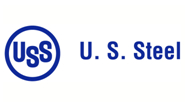Market Segment

October 31, 2021
U.S. Steel Eyes New Pig Iron Plant at Gary, New Coating Line at Big River
Written by Tim Triplett
With record third-quarter earnings of $2 billion in the bank, U.S. Steel President and CEO David Burritt offered a bullish outlook for the steel industry and his company in 2022. Highlights of the company’s earnings call on Friday included an update on the steelmaker’s progress in finding a site for its new electric arc furnace mill, its plans for electrical steel and coating lines at Big River Steel, and its strategy for a partnership to begin producing pig iron.
![]() “Our strong performance year-to-date, continued bullish outlook for 2022 and beyond, and expectations for the super-cycle continuing, put us in a position to move faster on the next phase of our strategy execution,” Burritt told analysts and investors. “Whether you’re looking only at next year or our ability to build long-term value, we believe investors are undervaluing our progress and potential. But not our customers. They are noticing the transformation that’s taking place at U.S. Steel. … Whether it is advanced high-strength steels, differentiated electrical steels, or green and sustainable steels, discussions with customers continue to shift from transactional to strategic.”
“Our strong performance year-to-date, continued bullish outlook for 2022 and beyond, and expectations for the super-cycle continuing, put us in a position to move faster on the next phase of our strategy execution,” Burritt told analysts and investors. “Whether you’re looking only at next year or our ability to build long-term value, we believe investors are undervaluing our progress and potential. But not our customers. They are noticing the transformation that’s taking place at U.S. Steel. … Whether it is advanced high-strength steels, differentiated electrical steels, or green and sustainable steels, discussions with customers continue to shift from transactional to strategic.”
The Pittsburgh-based steel giant reported third-quarter 2021 net earnings of $2.0 billion on sales totaling $5.964 billion – a big turnaround from the net loss of $234 million on sales of $2.34 billion in the same quarter last year.
Company executives pointed to what they consider the company’s three competitive advantages: low-cost iron ore, lower greenhouse gas emissions through minimill steelmaking, and best-in-class finishing capabilities. They also reported their first step in a new metallics strategy “that pivots our iron ore advantage in Minnesota towards our growing fleet of EAFs.”
U.S. Steel is finalizing an agreement with “a strategic partner” to annually produce up to 500,000 tons of pig iron at Gary Works. Under the possible deal, the unnamed partner would fund, install and operate pig iron production assets, which U.S. Steel would supply with excess liquid iron production. Pig iron production could begin in Gary as soon as early 2023. “This potential partnership would further enhance the cost structure of Big River Steel by in-sourcing high-value metallics, while driving blast furnace efficiencies at Gary Works,” Burritt said. It would also reduced the minimill’s need for prime scrap.
Responding to an analyst on the call, Burritt added: “This gives us the opportunity to do some arbitrage on the scrap buy that we need, whether it’s for Big River or Minimill #2. We’re going to be able to use our own vertically integrated iron ore to give additional advantages to the minimills. We’ve already done some of that over the past year. We’ve been taking home scrap made in some of our blast furnaces and sent it down to Big River. That’s really helped them avoid having to buy more expensive prime scrap in the market. We’re looking at about 500,000 tons per year coming out of this pig machine. And we will continue to evaluate other opportunities to extract value from our iron ore assets as we grow the minimill segment.”
Site selection for the company’s planned Minimill #2 is well under way and construction could begin as early as first-half 2022. The new minimill will have 3 million tons of raw steel production capacity. Its finishing capabilities will include galvanizing of hot rolled and advanced high-strength steels, as well as painting and slitting. The company does not expect Minimill #2 to add to the overall production volumes of U.S. Steel, in light of idlings already announced at other facilities, but does expect it to contribute an additional $650 million of pretax earnings once fully ramped.
U.S. steel executives also discussed their plans to build a new, $280 million coating line at Big River Steel. The line will have the annual capacity to produce 325,000 tons of galvanized and Galvalume sheet for the automotive, appliance and construction industries. The line will produce a mix of 75% Galvalume and 25% hot-dip galvanized, creating opportunities to target the higher-value construction market, including exposed building panels, the company said.
U.S. Steel’s flat rolled segment delivered record EBITDA of $1.1 billion in the third quarter, a record margin of 32% and a 60% improvement versus the prior quarter. “Higher selling prices flowing through our contract structure in the third quarter will likely continue to be a tailwind in the fourth quarter,” said CFO Christine Breves.
Despite widespread predictions of a price correction, U.S. Steel foresees a favorable pricing environment next year. “Assuming the forward curve, which we believe to be a pessimistic view of spot prices, we fully expect average selling prices to be higher in 2022 than 2021 for our flat-rolled segment,” said Burritt.
In other financial news, U.S. Steel reduced its debt load by $3 billion, instituted a $300 million stock buyback program and reinstated a $0.05 per share quarterly dividend for stockholders.
By Tim Triplett, Tim@SteelMarketUpdate.com







